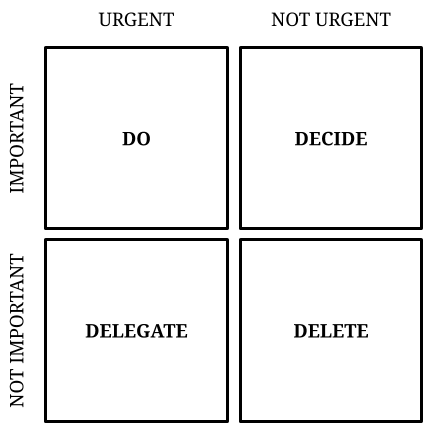The Power of Prioritization: Essential Techniques for Leaders
Eisenhower Matrix

- Urgent and important: Tasks that require immediate attention, such as addressing a pressing issue with a client or finalizing a project before a deadline.
- Important, but not urgent: Tasks that contribute to long-term goals, like strategic planning, employee development, and relationship-building.
- Urgent, but not important: Tasks that demand immediate attention but don't contribute significantly to your long-term goals, such as responding to emails or attending to administrative tasks.
- Neither urgent nor important: Tasks that have little to no impact on your goals, like browsing social media or engaging in office gossip.
The Pareto Principle (80/20 Rule)

Delegate to Empower: How Leaders Can Share Responsibilities
- Identify the right person for the task: Match tasks with team members who have the necessary skills, knowledge, and motivation.
- Clearly communicate expectations: Describe the task, its importance, and your desired outcome. Provide deadlines and any necessary resources.
- Monitor progress and provide feedback: Regularly check in on the progress of delegated tasks, offering guidance and feedback as needed.
Effective Meeting Management: A Time-Saving Strategy for Leaders
- Establish a clear agenda: Before scheduling a meeting, outline its purpose and goals. Share the agenda with attendees, so everyone comes prepared.
- Invite only necessary participants: Limiting attendees to those directly involved in the discussion can reduce meeting length and increase focus.
- Set time limits: Allocate a specific duration for each agenda item, and use a timer to keep the meeting on track.
Cultivate a Healthy Work-Life Balance:The Importance of Personal Time for Leaders
Set boundaries
Schedule personal time
Take breaks and vacations
Time Management Tools and Apps to Boost Your Productivity
- Trello: A visual project management tool that allows you to organize tasks using boards, lists, and cards.
- Todoist: A task management app that helps you create, prioritize, and track tasks across multiple devices.
- RescueTime: An app that tracks how you spend your time on digital devices, providing insights into your daily habits and productivity.
- Focus@Will: A music service that offers productivity-enhancing soundtracks designed to improve focus and concentration.
A Time for Reflection: Regularly Assess and Optimize Your Time Management
- Which tasks consume the most time? Can they be delegated or optimized?
- Are there any recurring distractions or time-wasting activities that can be eliminated or minimized?
- How well are you maintaining a work-life balance? Do you need to adjust your boundaries or schedule more personal time?
Related Courses
Management Mastery - Communicate with Influence
🚀 Learn the 8 critical skills to make you a confident and compelling leader.
How to Design and Run an Effective Meeting
Welcome to the top-rated course dedicated to building your reputation in a business-critical skill that you'll use your entire career
Survival Metrics: Prioritization for Product Managers
Learn a survival-metrics system that turns roadmap anxiety into clear, defensible stop / pivot / invest decisions.
Personal Productivity Science Essentials
Boost productivity with science-backed strategies to focus, beat procrastination, use AI smartly, and build lasting habits for your goals.
Lead With unCommon Sense
Go from a forgettable manager to a magnetic leader who elevates the trajectory of your team and your business
Delegate Smarter with People and AI: Lead More, Do Less.
Stop drowning in meetings and admin. AI templates and playbooks free up hours so you can focus on leadership.
You might also like

How to Run 1:1 Meetings: Tips, Questions and Agenda Template

Practicing Emotional Intelligence as a Leader

Risk Management: Lessons from Dropbox Paper

